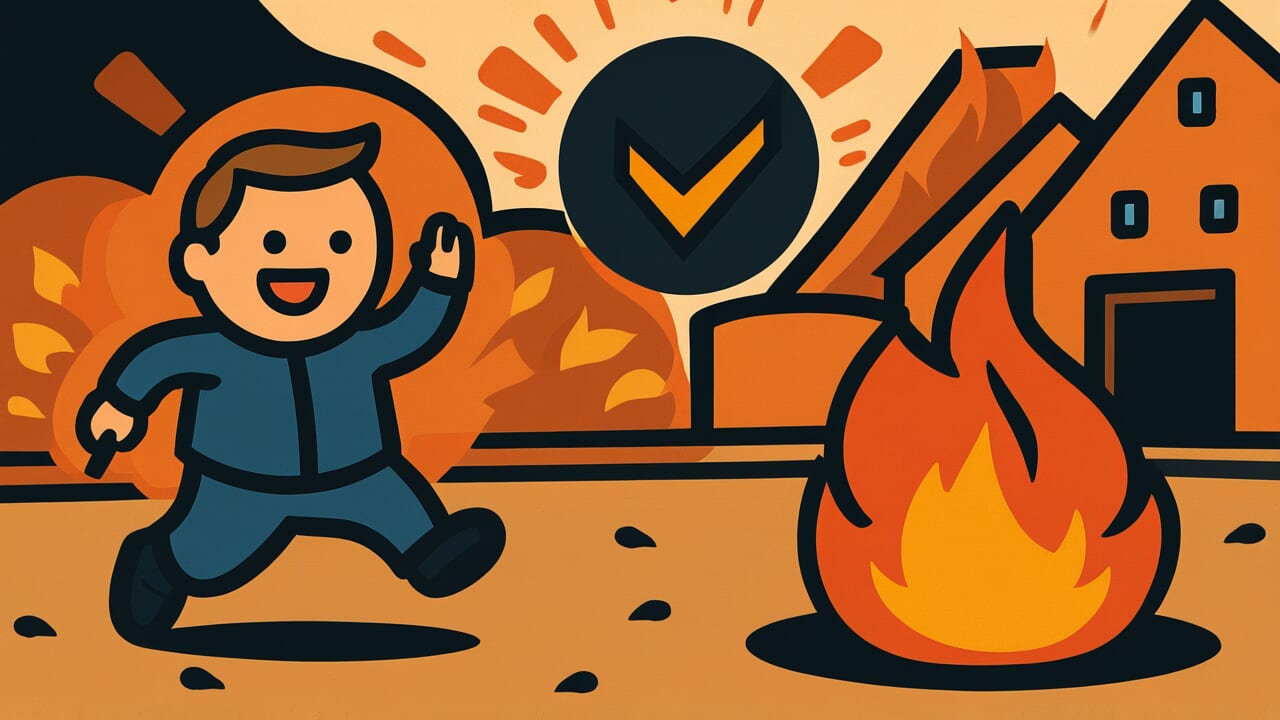How to Read “If you don’t rescue a small leak, it will lead to great destruction”
Sukoshi ki wo sukuwazareba taiha ni oyobu
Meaning of “If you don’t rescue a small leak, it will lead to great destruction”
This proverb teaches that small damages or problems, if left unattended, will eventually develop into irreparable major disasters. It emphasizes the importance of dealing with minor flaws or issues early, rather than dismissing them as “no big deal.”
This saying is used when warning someone who is about to overlook a small trouble or irregularity they’ve noticed. It also serves as a personal reminder to stay diligent with daily inspections and maintenance.
Today, this wisdom applies far beyond managing buildings and tools. It extends to health care, relationships, work problems, and organizational management.
The proverb teaches us the value of prevention. Taking appropriate action in the early stages can prevent major losses in the future.
Origin and Etymology
This proverb was used in ancient Japan, but there is no established consensus on its first documented appearance. However, examining the structure of the words reveals how it came to be.
The word “sukoshiki” is an old Japanese term meaning “a small thing” or “a slight matter.” Unlike the modern word “sukoshi” (a little), it’s used as a noun.
“Sukuu” means “to treat” or “to repair,” and here it carries the sense of “to address.” “Taiha” means “to break greatly” or “major destruction.”
The background of this expression likely lies in the wisdom of maintaining traditional Japanese architecture and tools. In an era centered on wooden construction, ignoring small cracks or damage would allow rainwater to seep in, eventually causing the entire building to rot.
Similarly, with farming and fishing tools, overlooking minor damage could lead to major breakage during use, sometimes resulting in life-threatening accidents.
Practical wisdom cultivated through daily life was elevated into a life lesson that applies broadly. This proverb embodies the Japanese aesthetic of cherishing possessions and never neglecting careful maintenance.
Usage Examples
- My computer has been running a bit slow lately, but since “if you don’t rescue a small leak, it will lead to great destruction,” I should do maintenance now
- Even slight discomfort in relationships can become major rifts if ignored—truly “if you don’t rescue a small leak, it will lead to great destruction”
Universal Wisdom
The truth this proverb speaks is deeply connected to the human psychology of procrastination. We instinctively want to look away from small problems right in front of us.
Why? Because facing them is troublesome and requires time and effort. The inner voice saying “it’s still okay” or “I’ll do it later” is a truly sweet temptation.
However, our ancestors realized through long experience a crucial fact. Small problems never disappear naturally. Rather, they grow steadily over time.
This applies not only to physical damage but also to anxiety and doubt in people’s hearts, and small tears in organizations. Neglected problems grow like living creatures, eventually transforming into uncontrollable major crises.
This proverb has been passed down for hundreds of years because it gives us courage to face our human weaknesses. The observational skills to notice small problems, the humility not to dismiss them, and the decisiveness to deal with them now despite the inconvenience.
These are timeless wisdoms for protecting our lives, regardless of the era. Our ancestors teach us that today’s small courage creates tomorrow’s great peace of mind.
When AI Hears This
Complexity science research has revealed that just before a system collapses, there exists a boundary called a “critical point,” and specific signals appear as it approaches.
For example, several years before a lake ecosystem collapses, water quality data shows a subtle change called “increased fluctuation.” The difference between good and bad water quality days gradually grows larger.
This phenomenon, called “critical slowing down,” signals that the system’s ability to recover from external changes is weakening.
What’s fascinating is that critical slowing down is commonly observed in completely different phenomena: forest fires, financial market crashes, and climate shifts. Before the 2008 financial crisis, stock price volatility increased.
As the Sahara Desert transformed from greenland to desert, rainfall variability expanded.
The core of this proverb is that small damage becomes “the trigger that crosses the critical point.” A small crack in a ship’s hull may not be a problem by itself.
However, if the entire system has already deteriorated close to the critical point, it becomes the trigger for cascading destruction. Modern predictive science is advancing research to detect such minute signals and predict large-scale collapse.
The ancients grasped the essence of critical point theory without mathematical formulas.
Lessons for Today
What this proverb teaches modern you is “a way of life that values small discomforts.” Our daily lives overflow with countless small signs.
Slight physical ailments, minor discomfort in relationships, small mistakes at work, slight disorder in household finances. These are important messages your life is sending you.
Modern society is busy, and we tend to overlook things thinking “this much is nothing.” But stop and think. Haven’t you had experiences where avoiding 10 minutes of effort today meant spending hours or even days dealing with it next month?
What matters isn’t aiming for perfection. It’s having the sensitivity to notice small problems and the courage to face them.
Regular dental checkups, a word of gratitude to someone important, backing up your computer, the habit of saving. All may seem mundane and bothersome.
But the accumulation of such small actions protects your future. Don’t postpone until tomorrow what you can do today. That is the sure path to a peaceful and secure life.



Comments